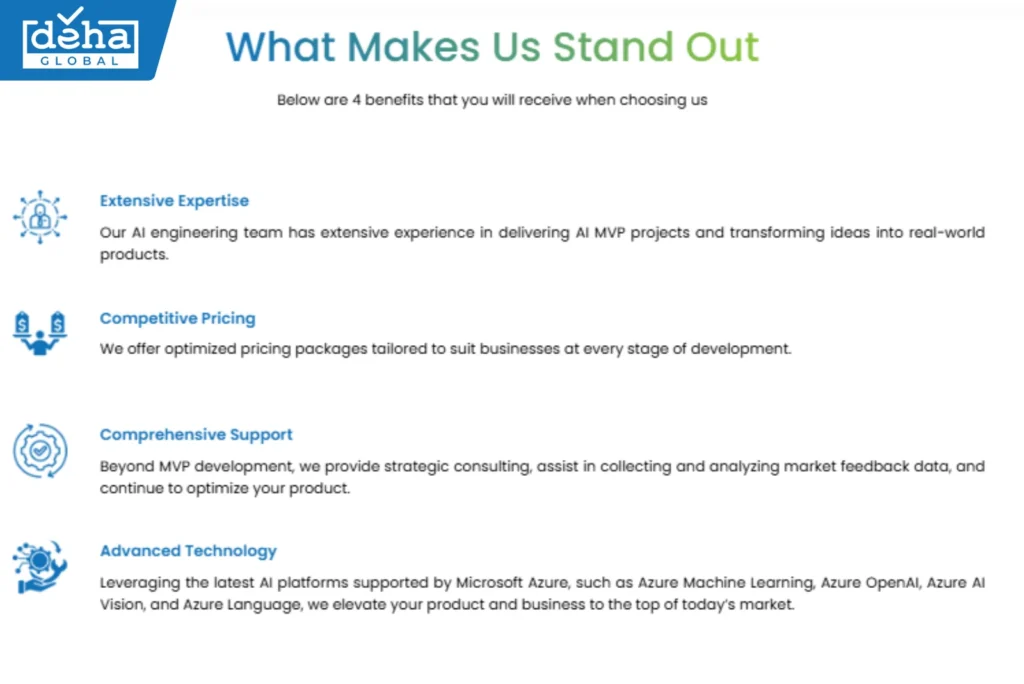Table of contents

Outsourcing the development of an AI-powered Minimum Viable Product (MVP) can offer startups and businesses access to specialized expertise, cost savings, and faster time-to-market. However, to reap these benefits, it’s essential to approach outsourcing strategically. This article delves into nine critical factors to consider when selecting an outsourcing partner for your AI MVP development.
Before engaging with an outsourcing partner, it’s vital to have a well-defined vision for your AI MVP. This includes specifying the core functionalities, target audience, and success metrics. Clear objectives serve as a roadmap, guiding the development process and ensuring alignment between your business goals and the outsourced team’s efforts. Without this clarity, there’s a risk of miscommunication and misaligned expectations, which can lead to project delays or unsatisfactory outcomes.
To optimize this factor, document your MVP’s requirements in detail, including user stories, technical specifications, and desired outcomes. Share this documentation with potential outsourcing partners during the selection process to assess their understanding and capability to deliver on your vision. Regularly revisit and update these objectives as the project evolves to maintain alignment and adaptability.
Selecting the right outsourcing partner requires a thorough evaluation of their technical skills, industry experience, and previous work on similar projects. An experienced partner will not only have proficiency in AI technologies but also understand the nuances of MVP development and your specific industry requirements. This expertise is crucial for anticipating challenges and delivering a product that meets your business needs.

To assess a partner’s expertise, review their portfolio, request case studies, and seek client references. Engage in technical discussions to gauge their problem-solving approach and familiarity with AI tools relevant to your project. Additionally, consider conducting a small pilot project to evaluate their performance and compatibility with your team before committing to a larger engagement.
Effective communication is the backbone of any successful outsourcing relationship. Establishing clear communication channels, setting expectations for response times, and scheduling regular updates are essential practices. These measures help in maintaining transparency, building trust, and ensuring that both parties are aligned throughout the development process.
To enhance collaboration, utilize project management and communication tools that facilitate real-time interaction and progress tracking. Encourage open dialogue and feedback to address issues promptly and adapt to changes efficiently. Cultivating a collaborative environment where both teams feel valued and heard contributes significantly to the project’s success.
Protecting your intellectual property (IP) and ensuring data security are paramount when outsourcing AI MVP development. Sharing sensitive information with external partners necessitates robust legal agreements and security protocols to prevent unauthorized use or breaches. Neglecting this aspect can lead to significant legal and financial repercussions.

To safeguard your IP and data, implement comprehensive Non-Disclosure Agreements (NDAs) and clearly define IP ownership in your contracts. Ensure that the outsourcing partner follows industry-standard security practices, including secure data storage, encrypted communications, and regular security audits. Additionally, consider the legal frameworks of the partner’s jurisdiction and how they align with your country’s IP and data protection laws.
Effective project management is the backbone of any successful AI MVP development. Adopting methodologies like Agile or Scrum can provide the flexibility and iterative approach needed for AI projects, allowing for continuous feedback and adjustments. These methodologies promote collaboration, transparency, and adaptability, which are vital when working with outsourced teams.
To optimize this factor, ensure that your outsourcing partner is well-versed in Agile practices. Regular stand-up meetings, sprint planning, and retrospectives can keep the project on track and aligned with your goals. Utilizing project management tools like Jira or Trello can also enhance visibility and communication between your team and the outsourced developers.
Quality assurance (QA) is paramount in AI MVP development to ensure the product functions correctly and meets user expectations. Implementing thorough testing procedures, including unit testing, integration testing, and user acceptance testing, can identify and rectify issues early in the development process.
Optimizing QA involves establishing clear quality standards and benchmarks. Leveraging automated testing tools can increase efficiency and coverage. Additionally, incorporating AI-driven testing services can further enhance the QA process by identifying patterns and potential issues that might be overlooked manually.
Post-development support is essential to address any issues that arise after the AI MVP is launched. This includes bug fixes, performance monitoring, and updates based on user feedback. A reliable outsourcing partner should offer ongoing support to ensure the MVP remains functional and relevant.
To optimize post-development support, establish clear agreements regarding the scope and duration of maintenance services. Regularly scheduled check-ins and performance reviews can help identify areas for improvement and ensure the AI MVP continues to meet user needs effectively.

Understanding the cost structure of your outsourcing partner is crucial to avoid unexpected expenses. Transparent pricing models and clear communication about potential additional costs can help align the project with your budget.
To manage costs effectively, define the project’s scope and requirements in detail before commencing development. Regular budget reviews and updates can help track expenditures and adjust plans as necessary to stay within financial constraints.
Scalability is a vital consideration for AI MVPs, as successful products often need to expand their features and user base. An outsourcing partner capable of scaling resources and adapting to evolving requirements can be a valuable long-term collaborator.
To assess scalability, discuss future plans and potential growth scenarios with your outsourcing partner. Ensure they have the capacity and willingness to support your product’s evolution, which can foster a strong, ongoing partnership.
By carefully evaluating these factors, you can make informed decisions when outsourcing your AI MVP development, setting the stage for a successful and sustainable product.
If you’re considering outsourcing your AI MVP development, DEHA Global offers a comprehensive suite of services tailored to startups and businesses aiming to integrate AI into their products efficiently. Their approach focuses on delivering high-quality, scalable solutions that align with your business objectives.
DEHA Global’s AI MVP development services encompass several key areas:

By partnering with DEHA Global, businesses can benefit from their extensive expertise, competitive pricing, and comprehensive support, making the outsourcing of AI MVP development a strategic and effective choice.
Outsourcing AI MVP development can be a strategic move for businesses seeking to leverage external expertise and accelerate product development. By meticulously evaluating potential partners against these nine factors, you can mitigate risks and set the stage for a successful collaboration that brings your AI MVP to fruition.